Gigabyte Aero 15 OLED Review
Gigabyte Aero 15 OLED Review
A high-end laptop for both content creators and gamers
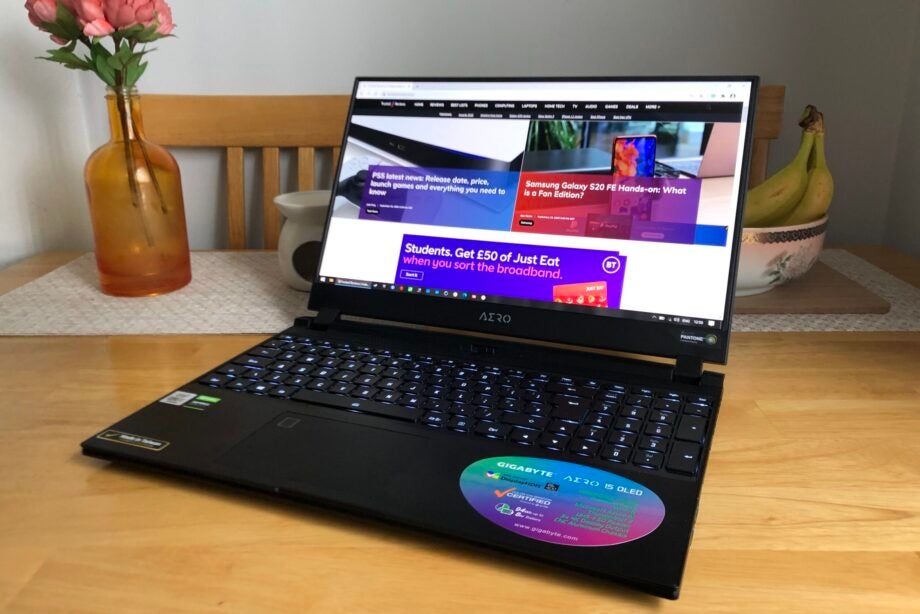
Verdict
The Gigabyte Aero 15 OLED is a remarkable device for the creatively minded while also boasting the capability to run AAA games, offering a strong performance in an office-friendly chassis. The display and trackpad have few rivals, although some small issues may turn gaming fans away.
Pros
- Impressive gaming and creative performance
- Gorgeous 4K 60Hz display
- Sleek office-friendly design
- Strong selection of ports
Cons
- Keyboard has room for improvement
- Bit of a fingerprint magnet
- Awkward fingerprint scanner
- SSD slower than competitors
Key Specifications
- Review Price: £2478.64
- 15.6-in 4K AMOLED 60Hz
- Up to Intel Core i9 10980HK
- Up to Nvidia RTX 2080 Super Max-Q
- Up to 64GB DDR4 RAM
- Up to 1TB NVMe SSD
- Windows 10 Home / Pro
- Dimensions: 356 x 250 x 20mm
- Weight: 2kg
The Gigabyte Aero 15 OLED may look like a gaming laptop – and even has the power to run the most demanding games – but this is actually a device focused on content creation, looking to challenge the likes of Apple’s MacBook Pro.
The stunning 15.6-inch 4K OLED display is all about creativity, ensuring that photos, videos and artwork all look as accurate as possible. Games look gorgeous on this display too of course, but with the OLED panel’s refresh rate maxing out at 60Hz, it won’t offer the smoothest visuals for fast-paced action blockbusters.
The Gigabyte Aero 15 OLED is also made to use anywhere without standing out in any other way than looking rather stylish. Along with its design chops, the Aero 15 OLED is packing the latest portable internals from Intel and Nvidia, but does it all sit nearly in a nicely presented package?
Related: Best Laptops 2020
Gigabyte Aero 15 OLED design – Hey, good lookin’
The Gigabyte Aero 15 may look a tad more “game-y” (think blinding LEDs and sharp edges) than the majority of creativity-focused laptops, but it remains a tame offering.
Gigabyte’s laptop gives off industrial vibes that indicate its a powerhouse without looking like an unsightly brick on your desktop, with flat edges and stylish black colour.
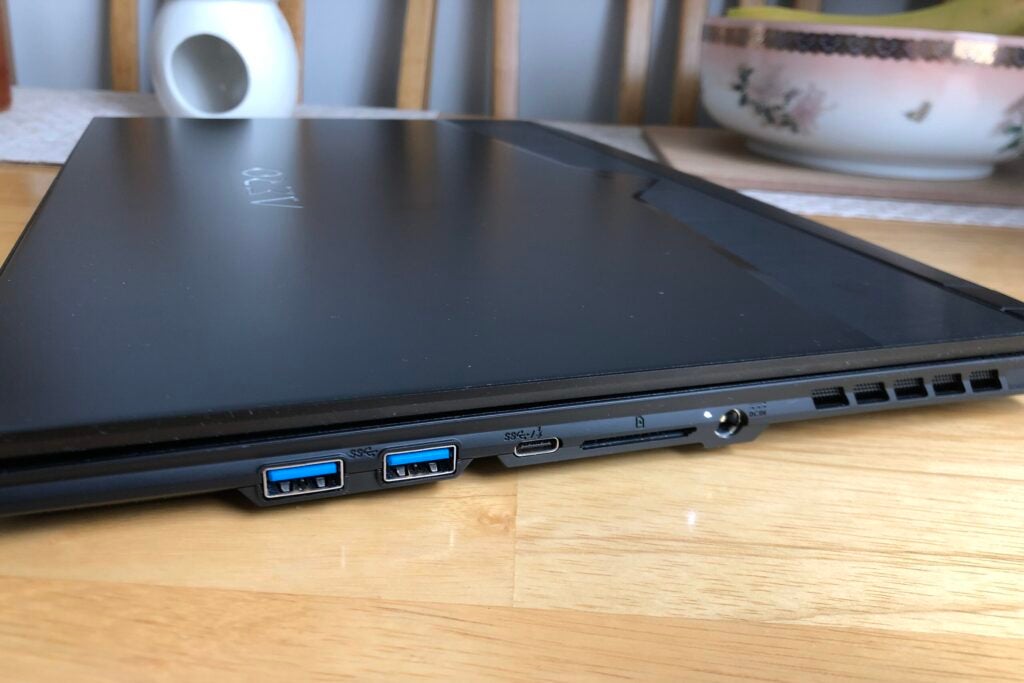
Gigabyte couldn’t quite resist the LED temptation, with customisable RGB backlit keys and a glowing light on the lid. The former ain’t half bad, but we could live without the latter.
For ports, there’s a plentiful selection on the Gigabyte, offering HDMI 2.0, 3x USB 3.2 Gen1, Thunderbolt (USB-C), Ethernet, Mini DisplayPort 1.4, headphone jack and an SD card reader. With that bumper combo, we’re not sure what more you could really ask for – the selection makes this an easily accessible option for creatives and gamers alike.
For those looking for a webcam, it sits at an up-facing angle, meaning it’s a bit of a nose cam, but the quality is decent enough and it has a manual privacy cover.
Related: Best ultrabooks
Gigabyte Aero 15 OLED keyboard – Not quite top drawer
The Gigabyte Aero 15 OLED offers a pleasant typing experience for the most part, but we don’t think it’s a stretch too far to ask for more at this price point.
The Gigabyte has plenty of travel and offers some clicky feedback, however, you do often feel like you are thudding on keys. We don’t think it’ll lead to fatigue and general use is good, but it’s not quite ‘clicky’ enough to be a competent gaming keyboard replacement.
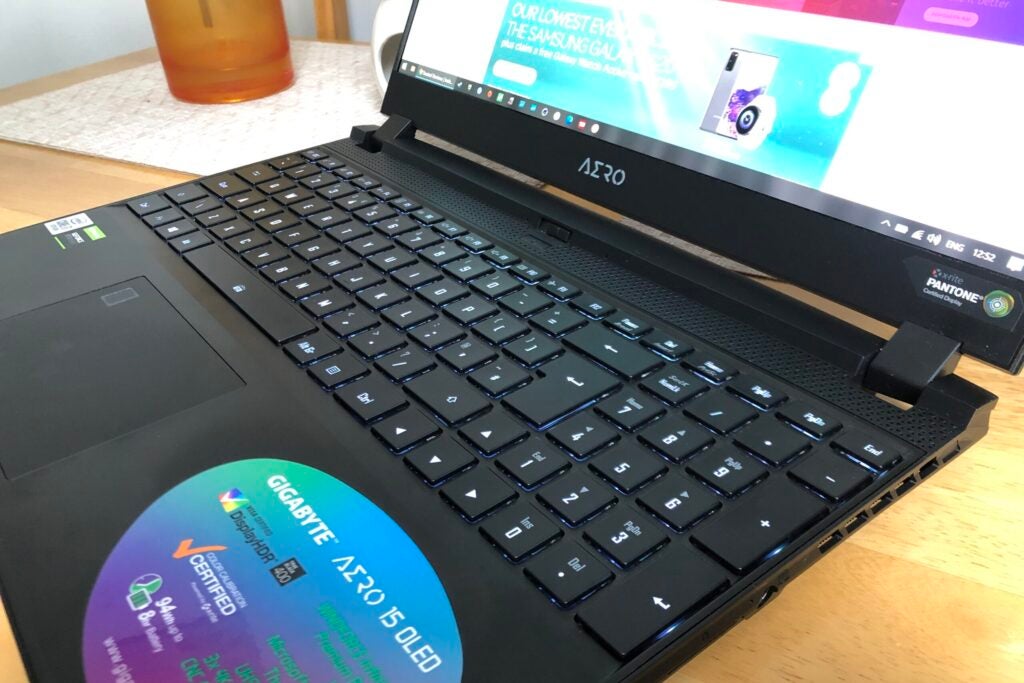
The trackpad isn’t a mixed bag and that’s because the trackpad is extremely good. While it may not be the biggest, it is one of the sturdiest and responsive trackpads around.
From corner to corner, the trackpad just screams premium with every press. Our only qualm is the fingerprint sensor, it takes up some room on an already small surface area and the way it blends into the trackpad meant I had some difficulty getting finger placement right when attempting to unlock.
Related: Best gaming keyboard 2020
Gigabyte Aero 15 OLED display – A perfect pixel party
The Gigabyte Aero 15 is available with a 144Hz Full HD panel or 4K AMOLED 60Hz display, and we’ve had the pleasure of testing the latter. Yes, it may not give that high refresh smoothness offered at 144Hz but, wow, the 4K panel does not disappoint.
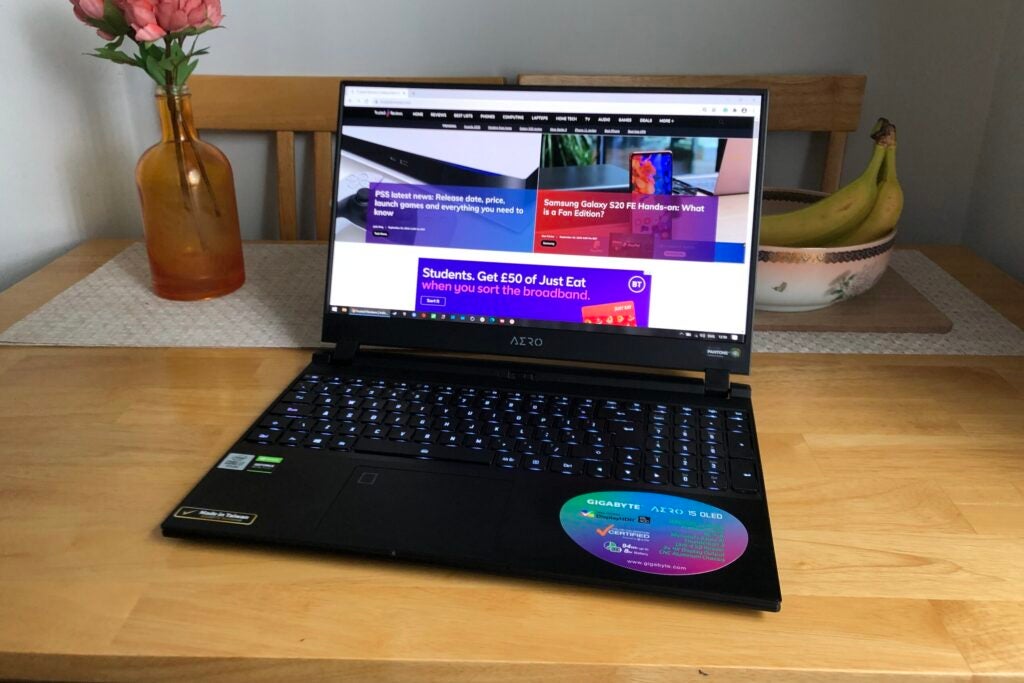
While the sleek looks of the hardware are the first thing that’ll catch your eye, the screen easily takes the crown when it comes to the most aesthetically-pleasing feature, offering bright and crisp colours. That OLED screen technology allows for high contrast, helping bright colours stand out better from darker shades.
Due to restrictions caused by Covid-19, I was unfortunately unable to use a colorimeter to test the display. However, 4K OLED screens generally offer superb colour accuracy, so we expect this to be a good option for content creation.
Related: Best gaming monitors
Gigabyte Aero 15 OLED performance – Creative and gaming cohesion
The Gigabyte Aero 15 is available in a lot of configurations, so you’ll have to bear that in mind when it comes to benchmarks, however, we will extrapolate as best we can.
Our review model features an Intel Core i7 10875H, 16GB RAM, a 512GB SSD and an Nvidia GeForce RTX 2070 Super Max-Q GPU which costs just under £2500 overall. You’ve got a couple of alternative processor options available, while the graphics cards range between the GTX 1660 Ti and the Nvidia RTX 2080 Super Max-Q so you’ve got plenty of choice.
Let’s dive into our benchmark results for the Gigabyte Aero 15 OLED:
| Gigabyte Aero 15 OLED
(RTX 2070 Super) |
HP Omen 15 2020
(RTX 2070) |
Apple MacBook Pro 16-inch (Radeon 5500M) | |
| Geekbench 5 single-core | 1327 | 1272 | 1211 |
| Geekbench 5 multi-core | 7439 | 6428 | 6631 |
| PCMark 10 | 5105 | 6464 | – |
| 3DMark Time Spy | 7239 | 6982 | – |
| Cinebench R15 | 1638cb / 141.35fps | – | 1367cb / 126.73fps |
The specs make for interesting reading but require some context. We reviewed the £1600 HP Omen 15 2020 with the slightly less powerful RTX 2070 and it also sports the lower specs i7-10750H, going some way to explain those differing results and the big gap in price. Then, it should be noted the model of MacBook Pro 16-inch costs £2699, highlighting the value you are getting with the performance of the Aero 15 OLED at under £2500.
When it comes to the creative side, the Aero 15 OLED performs strongly against the MacBook Pro in benchmarks, beating it handily in both, so creative professionals will definitely be at home with this device especially given its luxurious display.
On the gaming side, the benchmarks may make the price had to justify. Unless you are eager for a 4K panel, your money will be better served investing in the more affordable Full HD non-OLED 144Hz model, but then you face stiff competition from the likes of the HP Omen 15 and Razer Blade 15 2020.
| Gigabyte Aero 15 OLED
(RTX 2070 Super) |
HP Omen 15 2020
(RTX 2070) |
|
| Shadow of the Tomb Raider | 82fps (4K: 33fps) | 80fps |
| Borderlands 3 | 53fps (4K: 27fps) | 52fps |
| Dirt Rally | 82fps (4K: 55fps) | 159fps |
Nevertheless, the gaming performance remains strong and, if you are a creative who likes to game too, then you’ll be getting the best of both worlds with this device.
If loading and saving tons of data is part of your day-to-day, then SSD speeds will be important to you. The Aero 15 OLED comes in with a read speed of 2119 MB/s and a write speed of 978 MB/s. The read speed is perfectly acceptable but, for creators, the sub-1GB write speed isn’t ideal and can definitely be topped elsewhere. In particular, the MacBook Pro offers double the write speeds.
The fans never get prohibitively loud on this device either. As expected for such a high-powered device, they do kick up when running at high settings but it falls in line with the competition. The fans stay at a relatively minor lull during normal workloads – it’s definitely an office-friendly device even if it’s not silent.
The speakers in Aero 15 aren’t to be sniffed at. They won’t replace a good pair of headphones or external speakers but, for the times that you have to go without, you won’t be put out by using them. The sound is crisp and can get loud without much distortion, however, there is a distinct lack of base.
Related: Intel Tiger Lake
Gigabyte Aero 15 OLED battery life – Passable for a powerhouse
When you consider the creative and gaming capabilities of this machine, the battery life makes perfect sense. Our benchmark saw the battery measure at around six hours and 30 minutes. We also got a similar result when the resolution was turned down to 1080p from 4K.
The rivals we chose for benchmarking, HP Omen 15 and MacBook Pro 16-inch, came in at just under four hours and upwards of nine hours respectively. So, while the Aero 15 may fall short of a full and rigorous workday, it’s certainly a device that can go for a good spell without being plugged in.
That said, our benchmark tests focused on day-to-day office tasks. If you’re doing creative work or gaming, then expect the battery to deplete far rapidly.
Related: MacBook Pro 2020
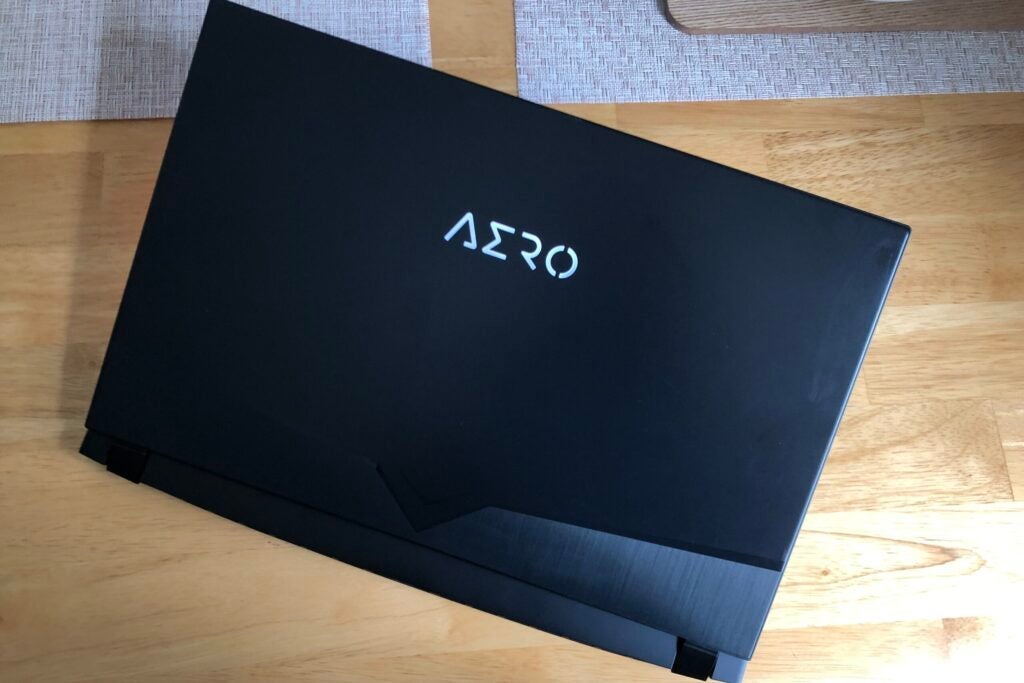
Should you buy the Gigabyte Aero 15 OLED?
The Gigabyte Aero 15 has a clear appeal in that it can deliver a top-notch performance for content creators, while also being capable of running AAA games in 4K. It may not be as polished as the likes of the MacBook Pro, but it offers oodles more versatility.
The 4K OLED display is one of the best we’ve ever used on a laptop. Even without the high refresh rate, it’s a joy to use for gaming, and media looks absolutely stunning. The only major drawback for content creation is the slow SSD speeds, which may give you some pause especially with stronger performing rivals.
Otherwise, the Aero 15 OLED feels like a laptop only a few key compromises. The RGB keyboard will likely attract gamers, but the rest of the design seems keen to maintain an office-friendly modesty. And, while the device doesn’t sacrifice too much in service of style, those who do want a sleek device may choose to consider the likes of the 16-inch MacBook Pro instead.
But if you’re keen for a machine that can competently run creative applications, while also being able to play AAA games on the side, there are few better laptops options than the Gigabyte Aero 15 OLED.
How we test laptops
Unlike other sites, we test every laptop we review thoroughly over an extended period of time. We use industry standard tests to compare features properly. We’ll always tell you what we find. We never, ever, accept money to review a product.

